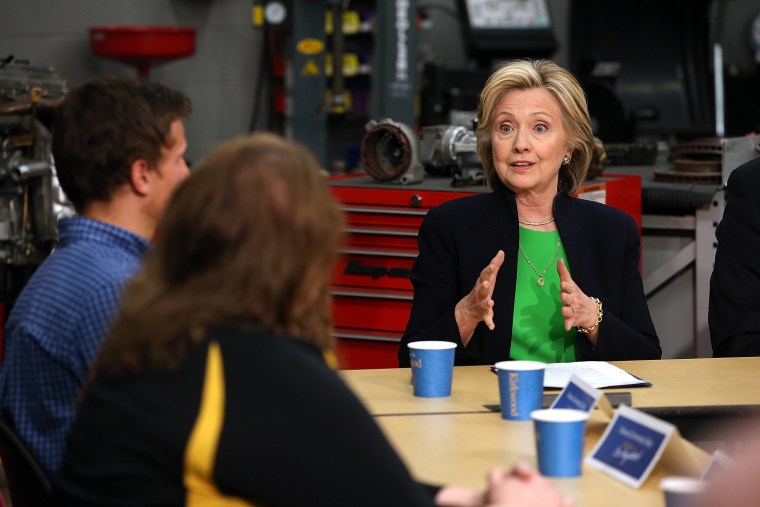The conventional wisdom suggests Hillary Clinton, lacking a credible primary rival, will effectively run a general-election campaign for the next year and a half. The Democratic frontrunner, who's never been the most liberal member of the party, will have the luxury of aiming for the center, much to the chagrin of the party's progressive base.
But as Clinton's campaign gets underway this week, it may be time to reassess those assumptions. Joy-Ann Reid
reported from Iowa yesterday:
Clinton ... articulated four pillars of her still-to-come campaign platform; four "big fights" she foresees on the horizon: building "the economy of tomorrow, not yesterday," strengthening families and communities, fixing "our dysfunctional political system and get[ting] unaccountable money out of it once and for all, even if that takes a constitutional amendment," and protect[ing] our country from the threats that we see, and the ones that are on the horizon."
According to a transcript made available to reporters by a campaign aide, Clinton struck a pretty populist tone during her remarks at Kirkwood Community College, emphasizing her concern that the "deck is still stacked in favor of those already at the top."
She added, "There's something wrong when CEOs make 300 times more than the typical worker. There's something wrong when American workers keep getting more productive, as they have, and as I just saw a few minutes ago is very possible because of education and skills training, but that productivity is not matched in their paychecks. And there's something wrong when hedge fund managers pay lower tax rates than nurses or the truckers that I saw on I-80 as I was driving here over the last two days."
For all the chatter about the left's suspicions of Clinton and the challenges she'll have in earning liberals' trust, it's worth appreciating the fact that her message yesterday was decidedly progressive -- and that's without the pressure of a primary challenger pushing her closer to party orthodoxy.
The one comment that arguably raised the most eyebrows was Clinton's reference to political reforms: "We need to fix our dysfunctional political system and get unaccountable money out of it once and for all, even if that takes a constitutional amendment."
It wasn't an explicit call for changing constitutional language, but for many reform activists, it was a high-profile near-endorsement -- and a pleasant surprise.
Clinton didn't delve into too many details -- not surprising given that this was only her second full day as a candidate -- but as the campaign unfolds, Andrew Prokop
sketched out what a possible constitutional amendment might look like.
The problem, as campaign finance reformers see it, is that for decades the Supreme Court has defined speech too broadly and corruption too narrowly. It has ruled that laws capping how much an individual or group can donate to a particular candidate are acceptable, because they help prevent corruption. However, overall caps on the amount any candidate or corporation spends on elections are unconstitutional, because they muzzle speech without specifically preventing corruption. (The court's narrow definition of "corruption" has consistently been disputed by some justices in the minority.) So the Democrats' proposed constitutional amendment specifically says that both Congress and state governments can limit the "raising and spending of money" meant "to influence elections." It lists several rationales for doing so -- advancing "democratic self-government" and "political equality," and protecting the "integrity" of the political process. However, it only says that "reasonable limits" are acceptable -- so if the amendment is ever enacted, there would undoubtedly be court battles over which restrictions are reasonable or unreasonable.
To be sure, there isn't too much risk for Clinton in endorsing a possible constitutional remedy -- amendments tend to originate in Congress and the White House has very little role in the process. Indeed, presidents can't even veto misguided ideas for amendments, since measures go to the states, not the Oval Office, after passing Congress.
Clinton, in other words, can endorse the concept without too many expectations about personally making an amendment happen.
Still, her rhetoric on this demonstrates her priorities and vision, which in this case came as welcome news to advocates of campaign-finance reform. The more the presumptive Democratic nominee embraces progressive ideals, the less I suspect we'll hear about the need for a competitive Democratic primary.
